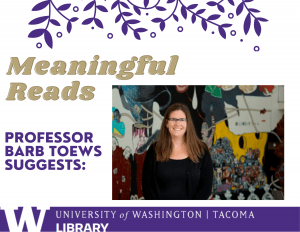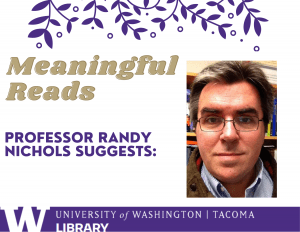Campus Meaningful Reads is a recommended book series celebrating faculty, staff, and students at the University of Washington Tacoma. Everyone is invited to share a book with thoughts on why the book was meaningful to their career, studies, or life.
This week, Dr. Barb Toews (SWCJ) and Dr. Randy Nichols (SIAS/CAC) are sharing their meaningful reads.
Barb Toew’s Recommended Reading: Transcending: Reflections of Crime Victims by Howard Zehr
 “We all know the saying that a picture is worth a thousand words and ever since I was a child, I have gravitated toward pictures way more than words. This love of images shapes my professional reading. I have a collection of children’s books, graphic novels, photography books, and cartoons that speak to social and criminal justice issues. Two books in my collection became Meaningful Reads finalists — The Big Book of Hell by Matt Groening, cartoons through which I first considered the environmental design of criminal justice spaces (my research area) and Transcending: Reflections of Crime Victims by Howard Zehr, portraits and interviews with violence survivors through which I deepened my understanding of the victim experience and paths toward justice and healing. In the end, Transcending won. The men and women featured in the book have survived violence of various kinds – e.g., rape, attempted homicide, child abuse, and the homicide of a loved one. While a painful read for sure, the survivors’ portraits and words taught me important lessons about what they need in the aftermath of violence, to heal and to experience justice. They also opened my eyes to the strength of the human spirit and our ability as humans to transcend deep pain and suffering. The men and women in the book engaged my head and my heart, challenging me to really listen to survivors and apply what I learned. This book, better than any academic textbook, has been my go-to book on the victim experience for the past 20 years. By now, I have my favorite survivors and can quote them off the top of my head. Take a criminal justice class with me and you are likely to read a few of those favorites or be assigned the book as a required textbook. Talk to me about your own experiences with violence and I’ll likely recommend the book as a source of comfort, support, and hope.”
“We all know the saying that a picture is worth a thousand words and ever since I was a child, I have gravitated toward pictures way more than words. This love of images shapes my professional reading. I have a collection of children’s books, graphic novels, photography books, and cartoons that speak to social and criminal justice issues. Two books in my collection became Meaningful Reads finalists — The Big Book of Hell by Matt Groening, cartoons through which I first considered the environmental design of criminal justice spaces (my research area) and Transcending: Reflections of Crime Victims by Howard Zehr, portraits and interviews with violence survivors through which I deepened my understanding of the victim experience and paths toward justice and healing. In the end, Transcending won. The men and women featured in the book have survived violence of various kinds – e.g., rape, attempted homicide, child abuse, and the homicide of a loved one. While a painful read for sure, the survivors’ portraits and words taught me important lessons about what they need in the aftermath of violence, to heal and to experience justice. They also opened my eyes to the strength of the human spirit and our ability as humans to transcend deep pain and suffering. The men and women in the book engaged my head and my heart, challenging me to really listen to survivors and apply what I learned. This book, better than any academic textbook, has been my go-to book on the victim experience for the past 20 years. By now, I have my favorite survivors and can quote them off the top of my head. Take a criminal justice class with me and you are likely to read a few of those favorites or be assigned the book as a required textbook. Talk to me about your own experiences with violence and I’ll likely recommend the book as a source of comfort, support, and hope.”
Barb Toews, Ph.D.
Social Work and Criminal Justice
Find Transcending: Reflections of Crime Victims in the Library
Randy Nichol’s Recommended Reading: Counting for Nothing: What Men Value and What Women Want by Marilyn Waring
 “There have been a number of books that have been crucial to who I am and how I understand the world. Some were fiction, like Gabriel Garcia Marquez’s One Hundred Years of Solitude; some were non-fiction and opened me up to new ways of thinking, like Vincent Mosco’s The Political Economy of Communication. Some I came across in college – like Ben Bagdikian’s The Media Monopoly – when I was just coming to understand what I’d do with my life. But the one that has had the most resonance for me over the last few years has been Marilyn Waring’s Counting for Nothing: What Men Value and What Women Are Worth. Feminism was my entry into thinking about issues of access, diversity, and equity, and this book took that to places I’d never considered, including making me rethink what my own discipline of political economy valued and how I wanted to approach it. I recently had the pleasure of teaching an excerpt from the book in one of my classes, and it was amazing to see the ways in which the questions Waring raised resonated in new ways in the current moment. In it, Waring provides clear demonstrations of the way in which the economy is a series of choices and that those choices have been problematic at best. While the book’s focus is largely on how work attributed to women and the value of the environment have been barely valued in traditional economic models, those examples made it clear that there are a range of other ways in which we might reconsider what we expect from the economy and economics. And, perhaps most importantly, it was a call to arms to us to make better choices and to seek ways to reimagine the economy, economics, and other disciplines to make sure that they serve us the way need. That idea that we have a choice – that we can change things – has been a powerful balm to me, all the more so when the students in my class began to think about how they might change things, as well. That hope has been amazing.”
“There have been a number of books that have been crucial to who I am and how I understand the world. Some were fiction, like Gabriel Garcia Marquez’s One Hundred Years of Solitude; some were non-fiction and opened me up to new ways of thinking, like Vincent Mosco’s The Political Economy of Communication. Some I came across in college – like Ben Bagdikian’s The Media Monopoly – when I was just coming to understand what I’d do with my life. But the one that has had the most resonance for me over the last few years has been Marilyn Waring’s Counting for Nothing: What Men Value and What Women Are Worth. Feminism was my entry into thinking about issues of access, diversity, and equity, and this book took that to places I’d never considered, including making me rethink what my own discipline of political economy valued and how I wanted to approach it. I recently had the pleasure of teaching an excerpt from the book in one of my classes, and it was amazing to see the ways in which the questions Waring raised resonated in new ways in the current moment. In it, Waring provides clear demonstrations of the way in which the economy is a series of choices and that those choices have been problematic at best. While the book’s focus is largely on how work attributed to women and the value of the environment have been barely valued in traditional economic models, those examples made it clear that there are a range of other ways in which we might reconsider what we expect from the economy and economics. And, perhaps most importantly, it was a call to arms to us to make better choices and to seek ways to reimagine the economy, economics, and other disciplines to make sure that they serve us the way need. That idea that we have a choice – that we can change things – has been a powerful balm to me, all the more so when the students in my class began to think about how they might change things, as well. That hope has been amazing.”
Randy Nichols, Ph.D.
School of Interdisciplinary Arts and Sciences: Culture, Arts, and Communication
Find Counting for Nothing: What Men Value and What Women Want in the Library
Thank you for sharing, Barb and Randy!
Interested in participating in Campus Meaningful Reads? Let us know by filling out this participation form!